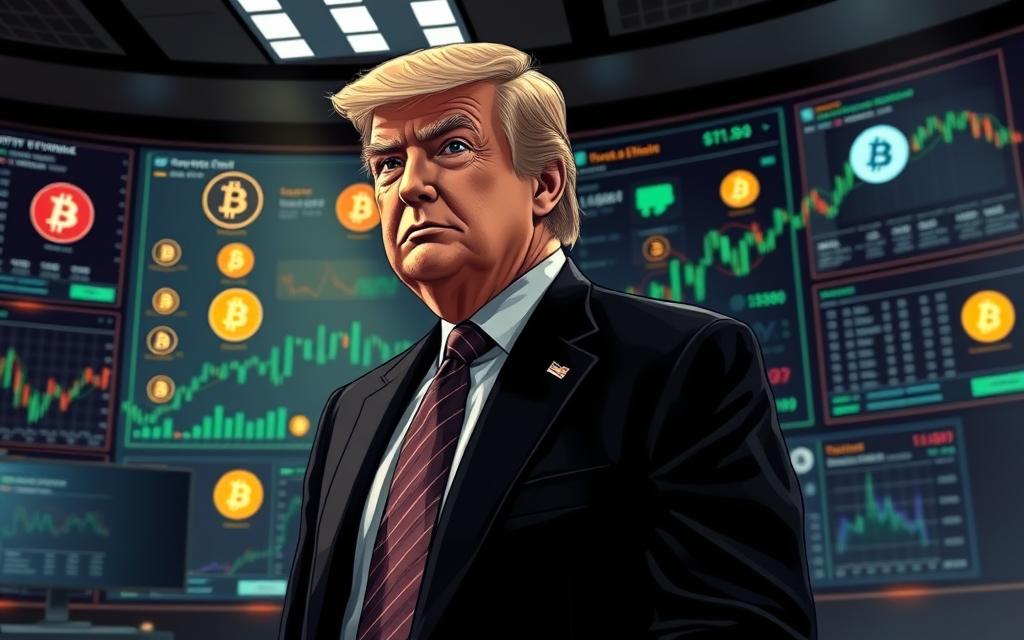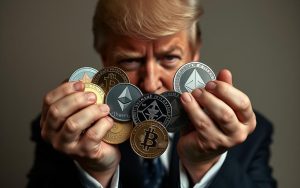Table of Contents
The White House has taken bold steps in the cryptocurrency industry under President Trump’s leadership. Recent executive actions, including the January 2025 Order, mark a dramatic shift in United States digital asset regulation.
Beyond policy changes, Trump’s personal ventures raise eyebrows. The launch of $TRUMP memecoin and exclusive investment schemes blur lines between public service and private gain. Harvard economist Ken Rogoff warns this could impact dollar stability.
Bipartisan reactions reveal deep divisions. Some praise innovation, while others question ethical conflicts. The cryptocurrency market responds with volatility as new rules take shape.
This analysis explores regulatory changes, market impacts, and the controversial mix of political power and personal financial interests in the emerging digital economy.
What Is Trump Doing with Crypto? Key Executive Actions
A sweeping executive order reshapes America’s approach to cryptocurrency markets. Signed January 23, 2025, this directive establishes the most significant regulatory framework for digital assets since Bitcoin’s inception.
January 2025 Executive Order on Digital Assets
The order immediately halted Central Bank Digital Currency (CBDC) development, citing privacy risks. It prioritizes private-sector stablecoins instead, requiring Treasury oversight for dollar-pegged tokens.
David Sacks serves dual roles as both Crypto Czar and Working Group chair. His team gained authority to modify existing regulations without congressional approval during a 180-day review period.
Creation of the President’s Working Group on Digital Asset Markets
This 12-member body includes SEC Chair Gary Gensler and CFTC head Rostin Behnam. Their mandate spans from revising custody rules to evaluating a national Bitcoin reserve concept.
The group’s first action reversed FDIC “pause letters” that restricted banking access for crypto companies. New FDIC leadership under Travis Hill now promotes fintech partnerships.
Repeal of Biden-Era Crypto Policies
Executive Order 14067—Biden’s 2022 crypto strategy—was explicitly revoked. The administration flagged 140 additional policies for potential cancellation within 60 days.
Notably, the SEC suspended enforcement actions against major players like Justin Sun. This pause allows reevaluation of what constitutes securities violations in blockchain markets.
Regulatory Shifts Under the Trump Administration
Federal agencies are rewriting the rulebook for blockchain businesses with sweeping changes. The SEC, Treasury, and Federal Reserve have introduced policies that redefine compliance for digital asset companies. These moves signal a pivot toward private-sector innovation with lighter oversight.
SEC’s “Crypto 2.0” Task Force and New Leadership
The SEC disbanded its enforcement-heavy approach under new Chair Paul Atkins, a vocal critic of “regulation by enforcement.” His Crypto 2.0 Task Force, led by Hester Peirce, prioritizes clear rules for token offerings and custody services.

Recent crypto developments include suspending cases against high-profile firms, reflecting a shift toward formal rulemaking. The agency also clarified that proof-of-work mining falls outside securities laws.
Pro-Crypto Appointments in Treasury and Banking Agencies
Treasury Secretary Scott Bessent, whose $300M crypto investment raised eyebrows, now oversees stablecoin policy. Federal Reserve Governor Michelle Bowman advocates for clearer banking access, reversing earlier restrictions.
The FDIC’s Travis Hill issued guidance encouraging partnerships between banks and fintech firms. Meanwhile, the DOJ shuttered its crypto fraud unit, citing “redundant enforcement.”
Potential Reversal of Banking Restrictions for Crypto Firms
National banks can now custody digital assets under revised OCC rules. The Federal Reserve withdrew 2023 guidance that limited dollar-token transactions, easing operations for exchanges.
State regulators remain divided. While New York’s BitLicense framework persists, California’s new Digital Assets Law creates a patchwork of compliance requirements. “The industry needs federal clarity,” argues Coinbase CEO Brian Armstrong.
Trump’s Personal Crypto Ventures and Conflicts of Interest
Political and financial worlds collide as personal crypto ventures spark controversy. The Trump family has aggressively expanded into digital assets, blending political influence with private profit. Critics highlight opaque LLC structures and foreign investments as red flags.
The $TRUMP Memecoin and Exclusive Access Schemes
Launched in March 2025, the $TRUMP meme coin offers tiered rewards tied to investment levels. A leaderboard system grants White House access to top holders, with 220 dinner attendees selected via purchase competitions.
| Investment Tier | Benefits | Holders |
|---|---|---|
| ≥ $100K | Private receptions | 47 |
| ≥ $1M | Policy roundtables | 12 |
| ≥ $10M | Executive briefings | 3 |
CIC Digital LLC, a Trump Organization subsidiary, controls 80% of the coin’s reserves. “This resembles a pay-to-play scheme,” Senator Blumenthal stated in his ethics inquiry.
Foreign Investment and Ethical Concerns
GD Culture Group’s $300M investment through a Chinese subsidiary raised alarms. Anonymous crypto buyers could influence policy, warns Elizabeth Warren, who calls it the “biggest corruption scandal since Teapot Dome.”
The SEC paused its fraud case against Justin Sun, whose TRX token powers $TRUMP transactions. Foreign holdings now represent 34% of the coin’s market cap.
Expansion of the Trump Family’s Crypto Empire
Eric Trump’s mining firm partnered with World Liberty Financial to raise $550M. The Trump family also launched USD1, a stablecoin offering reward points for MAGA merchandise.
Nested LLCs hide an estimated $2B in coin reserves across 14 shell companies. Legal experts question whether these holdings violate federal disclosure laws.
Market Reactions and Industry Impact
Investors face unprecedented volatility in politically-linked cryptocurrency projects. The $TRUMP memecoin exemplifies this turbulence, swinging from $75 to $18 before stabilizing at $42. Market analysts note 20% of trades occur through foreign-exclusive exchanges, raising transparency concerns.

Surge in Speculative Trading Around Trump-Linked Coins
Trading volume spikes follow White House announcements, creating pump-and-dump patterns. The MELANIA coin launch saw 400% gains within hours, while the Trump ETF attracted $120M in its first week.
Retail investors dominate these markets, with 78% of positions held by accounts under $10,000. “This resembles the Gamestop frenzy with political stakes,” notes Bloomberg analyst Jamie Coutts.
| Token | Peak Price | Current Price | Volatility Index |
|---|---|---|---|
| $TRUMP | $75 | $42 | 89% |
| MELANIA | $3.20 | $1.15 | 142% |
| Trump ETF | $25 | $22 | 34% |
Backlash from Democrats and Regulatory Pushback
Senate Democrats blocked the Genius Act, citing conflict-of-interest concerns. Elizabeth Warren introduced the Digital Asset Anti-Fraud Act, demanding disclosures for political-linked tokens.
The SEC reopened investigations into foreign trading platforms handling $TRUMP transactions. “We won’t tolerate market manipulation disguised as political enthusiasm,” stated Senator Blumenthal during hearings.
Energy and Environmental Concerns from Crypto Mining
Texas power grids struggled during peak mining operations, with energy demand jumping 18%. Trump-backed mining facilities now consume enough electricity to power 300,000 homes annually.
Environmental groups protest the carbon footprint, while industry advocates highlight job creation. The debate mirrors earlier campaign clashes over fossil fuel policies.
Conclusion
The crypto industry faces a pivotal moment as policy changes clash with personal financial interests. Recent executive actions signal a deregulatory shift, but ethical concerns linger over political-linked tokens.
State and federal tensions continue as some agencies push for stricter oversight. Global leaders may follow this precedent, creating new risks for investors worldwide.
Market volatility remains high, especially around president-affiliated projects. Upcoming congressional hearings could reshape the landscape further.
For deeper insights into these developments, explore how political shifts impact crypto markets. Investors should proceed with caution amid ongoing uncertainty.
FAQ
What executive actions has President Trump taken regarding cryptocurrency?
The administration issued a January 2025 executive order on digital assets, formed a working group for market oversight, and rolled back Biden-era policies restricting industry growth.
How has regulation changed under the Trump administration?
The SEC launched a “Crypto 2.0” task force, Treasury appointed pro-industry leaders, and banking restrictions on firms were reconsidered to encourage innovation.
Are there ethical concerns around Trump-linked crypto projects?
Yes. The $TRUMP memecoin, exclusive investment schemes, and foreign partnerships have raised conflict-of-interest questions involving the Trump family.
How has the market responded to Trump’s crypto policies?
Trading surged around politically themed coins, though Democrats and environmental groups criticized relaxed rules on mining and speculative trading risks.
Did the administration address fraud in the cryptocurrency space?
The working group prioritizes fraud prevention, but enforcement remains inconsistent as new meme coins and unregulated offerings emerge weekly.









